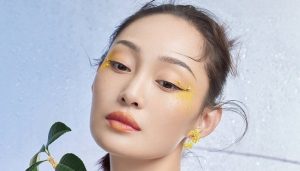Self-service selling of small-size cosmetics in an arty environment: this is the initial concept of Chinese company Harmay (話梅), which has just fundraised 200 million dollars thanks to investors, including American development capital company General Atlantic.
Since opening a first store in 2017, Harmay has sold small-sized products of Chinese and global brands for less than 100 yuans (14 euros). Thanks to an in-house architecture design team, it now owns nine stores in China and counts over 400 employees.
An immersive experience
“The main reason why capital invests in Harmay is that they have the recipe to attract consumers and especially the GenZ generation,” explains Juliette Duveau, co-founder of consulting agency The Chinese Pulse. She also says that “samples should account for a big part of their total sales”, but that “some consumers will still buy normal size in Harmay because it is a convenient shopping destination for them to collect all the products they want, and they will also pay for the immersive, cool experience to reshare”.
The brand does everything it can on social media to pass on the message that store visits are designed to be the most memorable possible. Every Harmay store has its own aesthetic, artistic, and friendly world where buyers can stroll (no shop assistant to help) and even have something to eat. “Harmay offers a coffee space in the ground floor of its Anfu Rd store, they just created their own drink brand @introlemons in 2022,” adds Juliette Duveau.
Harmay stores are also contemporary art places. “In addition to co-curating with artists, Harmay also officially launched a support plan for emerging artists, although the exhibition itself is not aiming at generating direct sales, but consumers are more willing to visit and consume in spaces with aesthetic identity”, analyzes Juliette Duveau.
The company has announced the funds raised would be used to develop in new categories, strengthen its digital presence with its own application, broaden its brand portfolio, and open stores in Wuhan, Guangzhou, and Shenzhen. Last November, Harmay purchased American makeup brand Kevyn Aucoin.
Harmay also stands out with its multiple partnerships and events with high-profile brands like Maison Margiela or Japanese high-end cosmetics brand BAUM, “as Chinese young generation wants to discover more niche and unique brands,” says Juliette Duveau.
The sample economy and new consumption ways
Harmay recently set up a partnership with Swiss company Firmenich specialized in fragrance and aroma creation to assert itself on the booming Chinese perfume market. According to Euromonitor data, the annual growth rate of this market should reach 22.5% over the next five years. By 2025, perfume sales in China should reach 4.7 billion dollars.
“This agreement makes sense, as China is going to be the second biggest fragrance market worldwide”, emphasizes Juliette Duveau. “Chinese young consumers are changing and evolving quickly. Harmay, as a giant multi-brand beauty retailer rooted in China, has a rich knowledge about the local beauty market and young consumers’ preferences in terms of lifestyle and shopping habits. Those assets can help Firmenich to understand better and adapt smartly to the consumers today.”
The Chinese media have noticed the emergence of this “sample economy”, a sign that young people are changing the way they consume cosmetics. But they also highlight the absence of regulations on this market, as there are doubts about the origin and authenticity of the samples. Harmay is pointed at for not providing precise information about its supplier chain.
“The Harmay critics are mainly relying on its initial business model, which can be considered as a kind of ’grey’ market. Harmay based its initial business model on selling brands’ samples online or by distributing some international brands’ products in a not always ’official’ way,” deciphers Juliette Duveau. However, the expert considers “the switch it operated over the past months in immersive and conceptual retail extension over China contributes to change this image.”
This article has been commissioned and published by Premium Beauty News.





